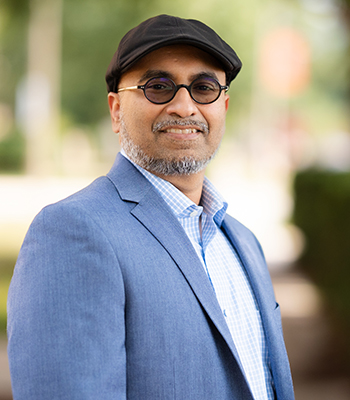
From Banking to Barbecue: Exploring risk management from two different worlds

In 2002, Tonny Thomas landed a job writing software for the US division of HSBC, a vast financial leader with corporate offices around the world. But it wasn’t until he moved into risk management that he understood how the business really worked.
“I saw how the sausage was stuffed,” says Thomas. “At the time I was on a payments e-commerce team, and that was a very defined sliver of the institution. But when you go into risk management, you're looking at retail bank, commercial bank, the global banking markets, insurance — all of these different products. And it just kind of opened my mind to say, ‘Wow, there's so much that I need to do. And risk management is the way I'm going to step into that ability to see across the whole organization.’”
That revelation led to an MBA in international finance at the University at Buffalo and a career at HSBC that took him all around the world, from senior manager of operational risk and control in New Zealand, to the global head of business risk and global payment services in Malaysia and finally the senior manager of compliance in Arlington Heights, Illinois. Then, after nearly 20 years in the business, he left the world of banking to pursue his own entrepreneurial aspirations.
In 2020, Thomas co-founded NakiNoku, an innovative food-tech startup in Chicago that helps small- and medium-sized food companies expand their brands. The company, whose name means “Taste & See,” achieved an industry first — repackaging a wide range of sauces and condiments in sample sizes and selling them directly to consumers. In addition to producing and shipping the samples, he gives customers other tools to help them build their brand.
“One of our partners is a brand that dates back to the civil war,” says Thomas. “The owner’s great-great-great-great grandfather was a freed slave who used to be a plantation cook. So, he had a recipe and he used that to become a pit master. It’s a beautiful story, but how do you tell that on the bottle?”
The solution is a QR code that directs shoppers to a website where they can learn the whole story. And while they’re there, they can order a wide range of small, inexpensive samples direct to their door. It’s a win for small companies seeking to grow their business and for consumers who no longer have to waste money sampling products in large bottles that end up in the back the fridge or the bottom of a landfill.
In 2024, Thomas used the flexibility he enjoyed as an entrepreneur to pursue another passion, teaching a course at DePaul University’s School of Continuing and Professional Studies. It was a unique opportunity to share everything he’d learned about risk management in two very different worlds. And soon, he was hooked. He loved connecting with students who were eager to learn and showing them the value of learning a broad range of skills that includes risk management.
“I would tell my students, ‘Connect with me on LinkedIn because I want to see where you go. I want to see the heights you’re able to reach because of what we talked about.’” And this fall, he’s bringing that same energy and passion to Gies Business, where he’ll be teaching FIN 230: Introduction to Insurance.
When asked why he wanted to join Gies, his answer was simple. “For me it’s a question of impact,” says Thomas, adding that “going to Gies is like the big time.” It’s a large school, with vast resources and a reputation for innovation and research. And for Thomas, it’s also an opportunity to impact students at an important point in their lives.
“A lot of the students that we're going to be talking to are very early in their career stage, even if they’ve worked before,” says Thomas. “By setting them on the right path of thinking about how they can gain experiences that grow their career, they can be — from day one — on the right foot going forward.”
To achieve that, students need a wide range of useful skills, taught by instructors who have applied those skills in the real world. But Thomas says that he hopes to imbue them with something more.
“In every class, we need to be teaching our students to be leaders. To be able to take care of others. To build people up,” says Thomas. “Because the kind of people that we are graduating and putting into the world should be the ones that bring honor to the university and to the work we do.”
